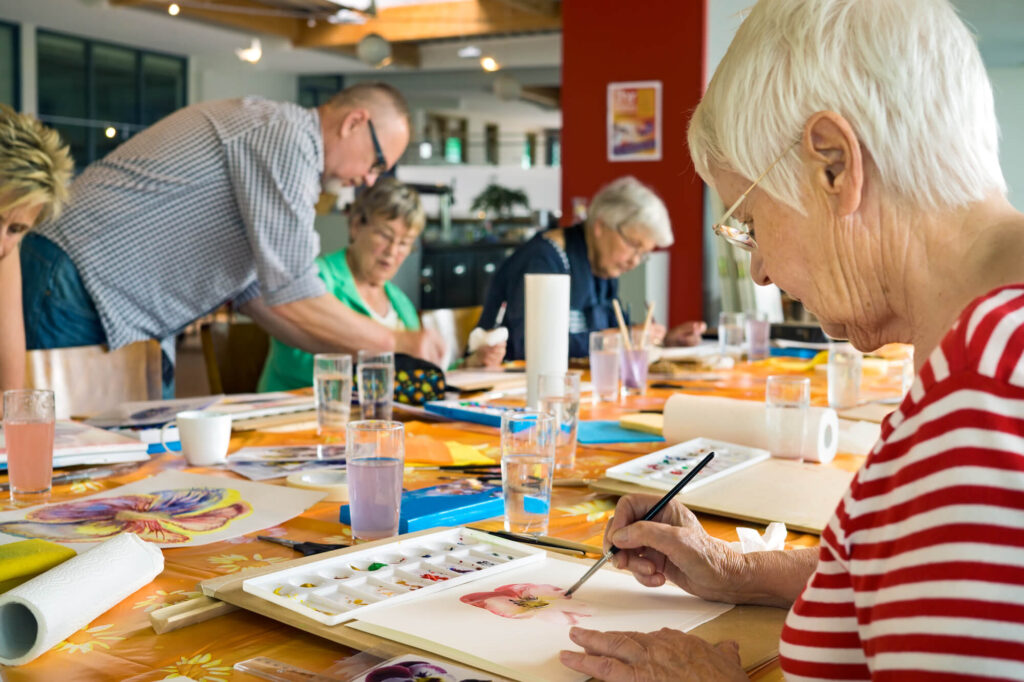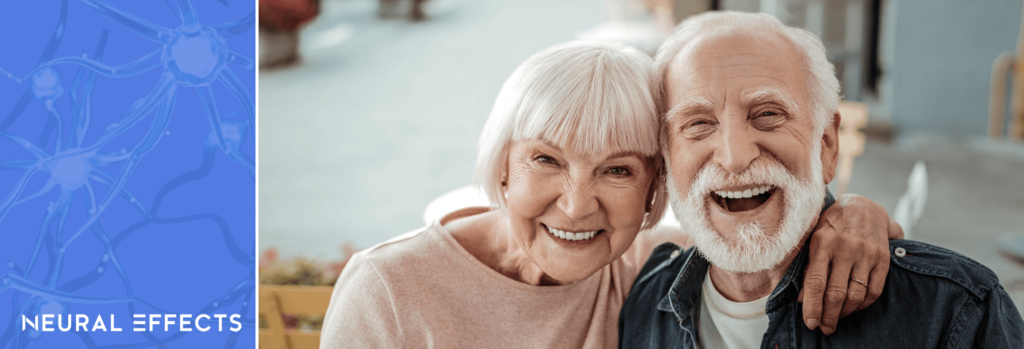Dementia is challenging to treat. Current prescription drugs, such as Donepezil or Galantamine, are often not as effective as patients expect and frequently cause side effects.
Fortunately, there are other ways to treat dementia that don’t involve taking medications (or which can be done in combination with pharmacological approaches). Some of these alternative therapies have been shown to slow down the progression of symptoms and improve quality of life.
At Neural Effects, we believe cognitive stimulation therapy (CST) is one of the best options for dementia patients. CST involves a series of activities and games designed to help patients stay mentally stimulated and socially engaged. By combining this therapy with cardiovascular exercise, we offer one of the most powerful therapy approaches for dementia currently available in the U.S.
In this article, we explain in detail…
- What is cognitive stimulation therapy (CST)?
- Is CST effective?
- What does CST at Neural Effects involve?
- What are the answers to some frequently asked questions about CST?
Neural Effects uses the latest evidence-based techniques to diagnose and help dementia patients. We are located in Provo, Utah and serve anyone in Salt Lake City or the Utah Valley area. We are in network for most types of medical insurance. Schedule your evaluation today.
What Is Cognitive Stimulation Therapy?

Cognitive Stimulation Therapy (CST) is an increasingly popular way to treat patients with mild to moderate dementia. The sessions are designed to be relaxed and fun, while at the same time creating opportunities for patients to learn, express their views, and engage with others in a social setting. Some CST groups choose to pick a special name or a theme song for their group. CST can be delivered by psychologists, occupational therapists, social care workers, nurses, and other healthcare professionals.
A “reality orientation board” is typically on display in the room, typically including information about the group, as well as the date, place, time, weather, and any other relevant information. Activities for the patients include discussing current affairs, playing puzzles or games, engaging in arts and crafts, or simply chatting with other group members and facilitators. Social engagement is a key component of CST, so sessions are done with small groups, typically with fewer than 10 patients (at Neural Effects, we maintain six patients per group).
Group sessions follow a similar structure overall, but each session is different. Patients are encouraged to discuss different themes, such as childhood events, favorite foods, or current affairs. The therapist can help group members stay on the subject and bring memories from their past into the current moment. For example, patients may discuss how things were in their childhood and compare them to how they are now. There is a strong focus on sharing opinions, rather than requiring patients to know information or facts.
Group members also engage in cognitive activities, often tailored to the group’s interests and needs. Examples include word and number games, puzzles, baking a simple recipe together, or learning to sing a song. Sessions may also involve doing some gentle exercise, such as yoga or throwing a softball to each other, as well as free time for group members to socialize as they wish. Ultimately, each group chooses the topics discussed and preferred activities.
When patients with dementia and their family carers were asked about their views on a CST program used for a study conducted in England, they shared:
“It was serious, but it was enjoyable… There was an awful lot of laughing.”
“Yes, you get other people’s point of view. If you are by yourself at home all the time, you haven’t got anyone to discuss anything with. Well, it’s better than stagnating at home saying nothing to anyone all day, isn’t it?”
“It always makes a change when you have to concentrate on something, it’s more helpful for your memory. … I think it makes you concentrate more on everything you’re doing, really.”
Is Cognitive Stimulation Therapy Effective?

The first CST program was developed by British psychologists Amy Spector, Martin Orell, and Bob Woods in the late 1990s and early 2000s.
While researching the effectiveness of different therapies for dementia patients, they found that cognitive interventions were the most effective in terms of slowing down the progression of symptoms and helping patients with their activities of daily living (ADLs). In fact, some of these sessions were as effective as medications used to treat cognitive symptoms such as memory loss and difficulty learning new information. Borrowing some techniques from reality orientation, multi-sensory stimulation, reminiscence therapy, and cognitive therapy, the researchers developed a 14-session program designed to run twice a week for seven weeks.
Relying on cognitive tests, including the mini-mental state examination (MMSE), initial studies and clinical trials consistently found that CST has a positive effect on patients’ cognitive function, mental health and quality of life. Patients reported improvements in memory and other symptoms of dementia, increased self-esteem, and more confidence to join in conversations and other activities. In addition, CST helped them feel relaxed, supported, and socially connected, which had a big impact on these patients’ well-being.
Some programs offer individual CST (called iCST), but these programs lack the benefits of group social interaction.
CST can be beneficial even for older adults (patients over 80 years old). The advantage is that CST programs can be adjusted as needed for the patients. For example, very old adults may benefit more from the use of reminiscence strategies that help them remember events from the past instead of cognitive games or sensory stimulation activities.
Overall, researchers from around the world have conducted multiple studies and randomized controlled trials to assess CST. These studies, which examined CST’s outcome measures, show that it:
- Improves memory and thinking skills
- Slows down the rate of cognitive decline and maintain cognitive abilities
- Improves their quality of life
- Improves communication and language skills
- Improves mood and alleviate depression
- Minimizes aggressive or challenging behavior
- Helps with social skills
- Reduces caregiver burden
- Increases opportunities to socialize for caregivers
Cognitive Stimulation Therapy for Dementia Patients at Neural Effects

As we’ve seen, CST is effective and evidence-based. In the U.K., it is currently the only non-pharmacological treatment recommended by the National Institute for Health and Care Excellence (NICE) to treat patients with mild to moderate dementia. A recent study suggested that 90% of NHS memory clinics and nursing homes in the U.K. offer access to group CST. In addition, CST has been translated into at least eight languages and is routinely used in over 20 countries.
Although the program is available in the U.S., CST is not used to the same extent as it is in the U.K. and other countries. At Neural Effects, we include CST in our dementia care and treatment options. However, our clinic is not aiming to offer just CST to our patients. We want to go a step further. Our treatment program — called EMPOWER — combines CST with short exercise sessions that boost the effect of therapy and help delay progression of cognitive impairment (more on this later).
The EMPOWER program includes the following:
- Initial visit and diagnosis
- Cognitive Care Plan
- Cognitive stimulation therapy (CST) combined with aerobic exercise
- Family involvement
Initial Visit and Diagnosis
Before treatment starts, patients must complete a detailed neuropsychological exam (also called a neurocognitive evaluation) that reveals how dementia has affected their cognitive skills. Our therapists also assess physical abilities, such as reflexes, eye movements, balance, and posture. Finally, we evaluate patients for signs of anxiety, depression, or stress. This initial evaluation usually lasts around 2 to 2.5 hours. We use standardized tests that can be repeated to monitor the patient’s progress over time.
If you already have a dementia diagnosis, then this evaluation is primarily used to build your cognitive care plan. If you don’t have a diagnosis, then we can coordinate with your physician to determine whether you have dementia, and if so, what type you have.
Cognitive Care Plan

Once this evaluation is done, we write a cognitive care plan (CCP) for every patient. Everyone we assess receives a CCP, even patients who do not have dementia. (In this case, they can follow our recommendations to help protect their cognitive health.)
The CCP includes:
- Patient’s medical history
- Diagnosis
- Results from the assessment
- Risk factors and how the disease is likely to progress
- Lifestyle changes that may help the patient
- How the family can get involved
- Recommended treatment options at Neural Effects
Cognitive Stimulation Therapy Combined with Aerobic Exercise

Our treatment includes 14 sessions of structured one-hour group therapy sessions. Sessions run twice a week over seven weeks, and each one covers a different theme.
Each session starts with 10-15 minutes of aerobic exercise, typically done on a stationary bike for safety. We understand that some of our patients have health complications that may restrict how they’re able to exercise. Our therapists adapt these exercise sessions to what the patients can do in a safe and controlled manner.
Some patients may struggle with this exercise, but it is a vital part of treatment. Physical exercise increases blood flow to the brain and triggers a phenomenon called post-exercise cognitive boost (PECB). During PECB, the brain releases an important chemical called brain-derived neurotrophic factor (BDNF), which makes the brain more receptive to subsequent therapy.
After exercise, patients then engage in cognitive stimulation therapy. As described earlier, this involves a wide range of activities aiming to stimulate thinking and memory, including discussion of past and present events and topics of interest, word games, puzzles, music, and creative, practical activities.
At Neural Effects, two trained facilitators work with a small group of patients, usually around 8-10 people. Facilitators promote social interaction, and patients socialize with each other during the sessions, which can further help slow down the progression of symptoms.
If we find that patients may benefit from additional therapy, we refer them to specialists, such as neurologists, physical therapists, or psychologists, as needed.
Family Involvement
While our main concern is the patient, education for family members and caregivers is an important part of the EMPOWER program.
Family members and caretakers are invited to attend the first session to learn more about CST. They can help patients by repeating some of the activities and games at home.
Our therapists also educate family members about lifestyle changes that can help their loved ones, including engaging in regular exercise, eating a healthy diet, and keeping in contact with friends.
If you want to find out more, we’ve written in more detail about these lifestyle changes and how they can help dementia patients. Finally, our therapists give plenty of follow-up resources to the family and suggest support groups both for the patients and their caregivers.
Neural Effects uses the latest evidence-based techniques to diagnose and help dementia patients. We are located in Provo, Utah and serve anyone in Salt Lake City or the Utah Valley area. We are in network for most types of medical insurance. Schedule your evaluation today.
Frequently Asked Questions

Why should I consider attending group CST sessions?
Our CST sessions provide a friendly and supportive space to meet other patients with similar experiences. If you’re feeling a little anxious about attending, that’s normal. Our therapists are always happy to discuss any concerns you or your family may have. The group is intended to be fun, enjoyable, and interactive.
What if I don’t want to talk about something?
You will never be forced to share something you do not feel comfortable talking about.
What if it doesn’t help me?
Despite studies showing how effective CST can be, this therapy does not work for everyone, and it might not help you. If that’s the case, our therapists can advise on alternative therapies you may want to try, and our Cognitive Care Plan will give you ideas and suggestions about what you can do at home to help slow down the progression of symptoms.
Is cognitive stimulation the same as cognitive rehabilitation?
No, cognitive stimulation is not the same as cognitive rehabilitation.
Cognitive rehabilitation is a way to build on existing abilities and strengths to compensate for areas of weakness. This therapy is designed to help patients participate in everyday activities in the best way possible. For example, it may include using smartphones and calendars or setting alarms to help compensate for reduced cognitive function.
In contrast, CST promotes engagement in daily activities and stimulates cognitive and social function. This includes participating in group discussions, reading, or playing cognitive games, all with the aim to slow down cognitive decline.
I am interested in CST, what should I do next?
Contact our clinic to schedule your evaluation.
Do I need a doctor’s referral to visit Neural Effects?
No, you don’t need to be referred to us to get assessed. However, some insurance companies require referrals in order to cover the treatment. In addition, it’s good practice to visit a neurologist before coming to us to rule out other conditions and get prescription drugs for dementia if you need them.
I want to do CST, but I’m not from Utah. Where can I find this therapy?
You can find additional information in our accompanying post: Where to Find Cognitive Stimulation Therapy Near You
Neural Effects uses the latest evidence-based techniques to diagnose and help dementia patients. We are located in Provo, Utah and serve anyone in Salt Lake City or the Utah Valley area. We are in network for most types of medical insurance. Schedule your evaluation today.
Note: The references used in our infographic are as follows:
1. Spector, A., et al (2003). Efficacy of an evidence-based cognitive stimulation therapy programme for people with dementia: Randomised controlled trial. The British Journal of Psychiatry, 183(3), 248-254.
2. Chapman, S., at al. (2004) Effects of cognitive-communication stimulation for Alzheimer’s disease patients treated with donepezil. J Speech Lang Hear Res, 47: 1149-63.
3. Aguirre, E. et al. (2012) Cognitive stimulation therapy (CST) for people with dementia–who benefits most? Int J Geriatr Psychiatry, 28:284-90.
4. Saragih, I. et al. (2022) Effects of cognitive stimulation therapy for people with dementia: A systematic review and meta-analysis of randomized controlled studies. Int J Nurs Stud, 128:104181.
5. Lobbia, A. et al. (2018) The efficacy of cognitive stimulation therapy for people with mild-to-moderate dementia. European psychologist, 24: 257-277.
6. Aguirre, E. et al. (2013) Cognitive stimulation for dementia: a systematic review of the evidence of effectiveness from randomised controlled trials. Ageing Res Rev, 12:253-62.
7. Spector, A. et al. (2011) The impact of Cognitive Stimulation Therapy groups on people with dementia: views from participants, their carers and group facilitators. Aging Ment Health, 15:945-9.
8. Bailey, J. et al. (2017) An evaluation of Cognitive Stimulation Therapy sessions for people with dementia and a concomitant support group for their carers. Dementia (London), 16:985-1003.
